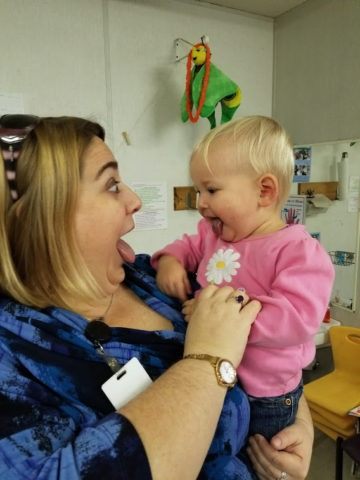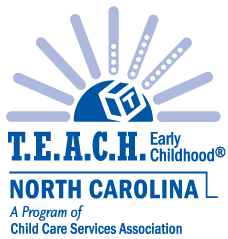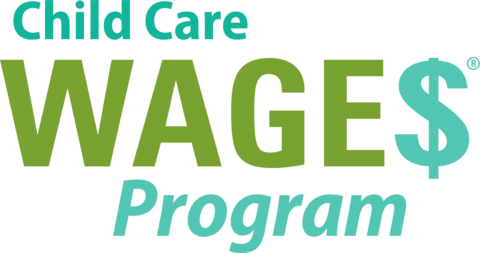
Catherine Lieberman grew up in and around the early education field because her mother was an early educator. She said, “Literally, the day I turned 18, I started working as a floater and it has always ‘called’ me. Whenever I think I need to leave and step into another role, I realize how much I miss the day-to-day contact with children and watching those discoveries happen. I’m the center director, but I’ve been in the classroom full-time due to COVID. I felt that it was best for children not to have to adjust to someone new so I stepped in to give stability.”
Catherine said she isn’t sure when she’ll be able to resume her director role because she is struggling to find qualified staff who have education and thus are more likely to share the center’s teaching philosophy. She’s also not willing to compromise on the safety protocols so she is looking for teachers willing to mask up even if they’ve been vaccinated.

The staff at Catherine’s center in Henderson County, Bell’s School for People Under Six, make her very proud. She said, “They are the most dedicated staff anyone could have the pleasure to work with. They are cheerful and come to work because they like it and are passionate, and they always put the children first. I have one on a T.E.A.C.H. Early Childhood® scholarship and another getting ready to be. I have teachers on WAGE$ and others who plan to apply.
“The teacher currently on scholarship started cleaning in the center and asked what it would take to get into the classroom. We had her sub to be sure it was something she wanted, then she took the NC Early Childhood Credential. Now she is on T.E.A.C.H. and I don’t see a ceiling for her. She is constantly growing. She is thinking more intentionally about what she does in the classroom because of the courses.”
Catherine started her own educational journey in early childhood to earn respect from parents. “When you say I’ve been in this business a long time, it’s different than when you say you have a strong educational background in this,” Catherine explained. “When you take your first class, you realize what you don’t know and then I was thirsty for the knowledge and for being with other educators who wanted the same. Once you start down that road of wanting to learn more, it really never stops. The field is always changing as new research emerges. Practice changes and our outlook changes. You have to keep going.”
As a result of her education, she’s more willing to listen to new perspectives and to slow down to see what children are really doing developmentally. She said, “I was passionate before, but I am twice as passionate now and I am a better advocate for the field and for myself as a teacher.”
T.E.A.C.H. helped Catherine, too. She said, “I don’t know if I would have finished my Bachelor’s Degree in Birth to Kindergarten in a timely fashion were it not for T.E.A.C.H. I might not have even followed all the way through, staring down another student loan. My first degree was in another field.”
COVID-19 has changed everything for Catherine and her center. She lost teachers and she didn’t take a personal paycheck for months. She went from a school population of 40 to six in two weeks. To keep some of her teachers, she chose not to pay herself and that was difficult, but she knows she is lucky to have a second income in her home that made this possible when many other owners couldn’t have done the same. She is keeping lower capacity now out of choice so she can give her teachers more down time.
Catherine said, “They are teaching in the middle of a pandemic and teaching children who are experiencing a form of trauma. And the teachers need more opportunities for recuperation and collaboration with each other. COVID-19 has changed everything about our practice and our program. I worry about so many more things now. I have so many more ‘What do I do if…’ questions.”
Catherine credits the Division of Child Development and Early Education (DCDEE) for helping to save her center. Despite serving the families of doctors, nurses and other essential personnel, she wasn’t sure they were going to survive. She couldn’t get PPP money despite many efforts, and she prioritizes teacher pay, which is nearly 80 percent of her overall budget. She was facing the reality that she could not pay the next month’s bills when DCDEE’s operational grants came through, making it possible for them to continue.

Another support she believes is important for the workforce is the salary supplement they receive from the Child Care WAGE$® Program. Henderson County joined WAGE$ in fiscal year 2021 and the Smart Start Partnership for Children (the Partnership) has funded the supplements at the highest tier, Tier Three. The check was bigger than Catherine expected and it helped her to pay health insurance. She said one teacher is getting her first WAGE$ check soon and she is a mom with four kids. It helps with day-to-day expenses, to keep her head above water.
She said, “With early childhood, we are not paid what we are worth. My husband makes almost twice what I do in the public schools and it still isn’t enough. We are always pushed to the side and the supplement elevates the professionalism of the field. It is recognition as much as money. What we do is valuable and important.
“It’s nice to know that the Partnership recognizes the importance of what we do and backs that with actual funding. They put their money into it and that makes teachers more willing to stay in the field. WAGE$ helps me reduce turnover. I dread turnover because it’s hard to rehire and it is bad for children. WAGE$ helps me hire qualified staff because it does put them on par with other educators. Public schools don’t want to lose teachers every four months, so why should child care?”
Providing these funds is important to the Partnership as well, according to Program Director Kelly Hart. Kelly said, “Smart Start Partnership for Children has long recognized the tremendous value of highly qualified early educators on our community’s overall well-being. We also know that teachers in early care and education settings are drastically underpaid for the important work they do. We are thrilled to partner with CCSA to provide the WAGE$ program in Henderson County to help increase compensation for early educators who are teaching our children in the most formative years of their lives and making a lifelong impact on children and families in our community.”
Professional compensation and benefits are needed to recruit and retain a high-quality early childhood workforce. Join the fight for Worthy Wages as we lead up to Worthy Wages Day this May 1 to help raise awareness and tell policymakers that early educators deserve worthy wages for the worthy work they do.
Visit Child Care WAGE$® and T.E.A.C.H. Early Childhood® to learn more about each program.




